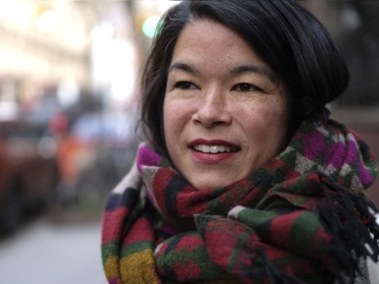In Their Own Words
November 7, 2018
Joseph O. Legaspi on “This Town, Empty Nest”


This Town, Empty Nest
There are no children here.
The adults are strangely erotic
in their miseries. This town,
wrecked, solemn, can be named
Longing: un-plucked wild berries
dripping along infinite roadsides.
Longing dreams of honey-buttered
milled bread of a conjured city.
You, familiar with hunger, Come here.
You, with feral memories of wood
and stove and bed, on your leaving,
exhale the poetry of an immigrant
mother, the loneliest of beings.
On “This Town, Empty Nest”
A poet, at times, is the last person to know or to know how to talk about his poems. So, it starts often with the declarative for me, an insistence. With this poem it is a banishment: there are no children here. What a lonesome, futureless place of absence and ghostly laughter. Where the poet fiendishly finds the adult miseries “erotic,” linked by sound with “wrecked,” totaling the solemn town. An idea of the naming is suggested coyly then carried out instantaneously: Longing, a smug poeticizing. Longing—desire—personified dreams of being another place, golden the color of honey, bearing the sustaining and intimate warmth of freshly baked bread. But dreams are make-believe, wishful meanderings, alternate realities, conjured escapes. The adults remain in their childless town, their longings fueling their sadness.
I refer to “This Town, Empty Nest” as an almost-sonnet, running short of the form with thirteen lines. As with the Petrarchan sonnet, however, there is a shift after the octave. A “You” is introduced: an outward movement, or an internal one, or both. It is an act of distancing, but also as with the second-person address it invites the audience as well as implicating him. But I wonder about this beckoning and suspect the poet of deflecting. He is one who left and so he seeks others to commiserate with. Come here, he commands one who shares his hunger, a parental imperative. Where is here, exactly? As if in the ether, what’s left are memories of the familial and elemental that make a home: wood, stove, and bed.
When working on the final drafts, pared down from the initial narrative two-pager, I stumbled upon the 13th line and knew I had my unexpected ending. As if it isn’t enough that my mother hovers as muse for most of my poems, this lyric situates her in the maelstrom. Her presence permeates albeit she’s referred to not ‘til the end and as a prepositional phrase. She is the particular adult among the masses, the one most longing and longed for. An immigrant who knows too well of extraction from home, the uprootedness, otherness, loneliness. Then we return to the speaker, guilt-ridden and grief-stricken, yet practiced on the art of leaving. He is an Other, too, and searches the world. He exhales, a pushing out, a coda of recitation. Is the poem an act of turning away from the muse? Abandonment of a creator in order to create? The mother is the poetry the son lives on.
More In Their Own Words

Jennifer Hayashida on “Chronology”
There is a story from when I was a small child and lived in Oakland, California, the city where I was born. One day, according to my mother, I disappeared, and my parents searched for me everywhere, inside the house and in the surrounding neighborhood. Supposedly, they searched for hours. They eventually found me sitting in a walk-in closet, behind some piece of furniture. I now have children of my own, and often wonder about a child's ability to remain still and quiet for so long.
Read Article
Emily Sieu Liebowitz on “I Am Always Leaving to Gather the News”
The title is taken from an Andre Breton poem, and I've sat with that line for a long time. The poem is in some ways a response to that line, an examination of the individual and the collective, and how events, lives, and people turn into news, history, and narrative.
Read Article